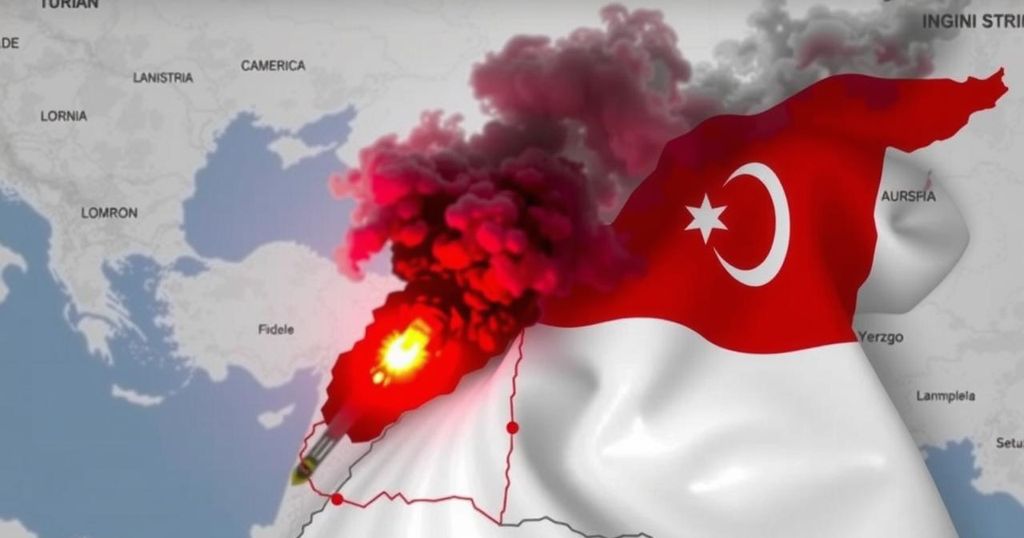World news
AFRICA, ANKARA, ASIA, BIDEN, BILL ROGGIO, CONFLICT, DONALD TRUMP, EUROPE/ASIA, FIGHTER JETS, FOX NEWS DIGITAL, JAKE SULLIVAN, JIHADIST GROUPS, MILITARY, NATO, NORTH AFRICA, NORTH AMERICA, PKK, REUTERS, SYRIA, SYRIAN CIVIL WAR, SYRIAN DEMOCRATIC FORCES, TRUMP, TURKEY, U. S, UNITED STATES, US, WAR, WASHINGTON
Daniel O'Connor
0 Comments
Trump Administration Faces Complicated ISIS Threat in Syria Amid Turkish Aggression
The Islamic State threat in Syria is escalating as attacks against U.S.-aligned forces increase, particularly following the decline of the Assad regime. President-elect Donald Trump will face the challenge of addressing this resurgence while managing relations with Turkey, which views the Syrian Democratic Forces as hostile. Efforts against ISIS, including recent U.S. military operations, may be undermined by escalating Turkish hostilities toward the SDF, complicating security dynamics in the region.
Concerns regarding a resurgence of the Islamic State (ISIS) in Syria have intensified following the decline of the Assad regime and continuing assaults on U.S.-aligned Syrian Democratic Forces (SDF). As President-elect Donald Trump prepares to assume office, the SDF may be compelled to reallocate its focus amidst threats from both ISIS and Turkish-backed forces. Recently, five SDF soldiers were killed due to attacks from these Turkish-supported factions, reflecting the escalating violence and instability in the region.
These attacks coincided with the apparent failure of a cease-fire arrangement facilitated by the Biden administration, which had aimed to stabilize the situation and bolster efforts against ISIS. National security advisor Jake Sullivan emphasized his paramount concern regarding the potential resurgence of ISIS, highlighting how the group exploits power vacuums in conflict zones. He articulated, “ISIS loves vacuums,” indicating that Syria’s current state of governance, weakened by Assad’s fall, poses risks for ISIS to reestablish a foothold.
For years, the U.S. has navigated a difficult balance between combating ISIS with the assistance of Kurdish forces and maintaining strong ties with Turkey, a key NATO ally that views the SDF as linked to the Kurdistan Workers Party (PKK), classified as a terrorist organization by Ankara. Bill Roggio, a senior fellow at the Foundation for Defense of Democracies, conveyed the precarious situation: “Turkey has the ideal opportunity to destroy the SDF, and it will take advantage of this unique situation.” The dynamics between these competing factions suggest an increase in hostilities, complicating U.S. strategy in the region.
In response to the amplified threat, the Biden administration has intensified operations against ISIS, targeting over 75 locations associated with ISIS leadership and infrastructure. Notably, CENTCOM confirmed the elimination of an ISIS leader, further pushing back against the group’s resurgence. Despite these measures, the SDF’s capability to operate freely may be compromised amid increasing Turkish offensives, raising significant concerns for the incoming Trump administration.
The SDF managed to capture 18 ISIS suspects near Raqqa, evidencing ongoing combat against ISIS remnants; however, their operational viability remains at risk. With rising pressure from Turkish-backed forces, U.S. officials are aware that balancing relations with Turkey while addressing the ISIS threat will be challenging. A spokesperson for the Trump transition team stated, “President Trump is committed to diminishing threats to peace and stability in the Middle East and to protecting Americans here at home.”
As the landscape in Syria continues to evolve, the upcoming administration will need to devise strategies that not only counter ISIS but also navigate complex geopolitical relationships that could significantly influence regional security.
The situation in Syria has become increasingly complex following the involvement of various factions seeking influence over the region. The U.S. has relied on the SDF, which primarily consists of Kurdish forces, in its efforts against ISIS. However, Turkey’s longstanding hostility toward the SDF complicates U.S. military strategy, as Turkey perceives the SDF as a terrorist affiliate. The shift in power dynamics following the decline of Assad’s regime leaves a potential vacuum that ISIS could exploit, thereby raising alarms within the U.S. government. The Biden administration’s cease-fire attempts and military operations against ISIS illustrate the urgent need to stabilize the region. Yet, as Turkey increases its military engagements against the SDF, the potential for renewed ISIS activity puts pressure on U.S. policy and diplomatic relations.
In summary, the challenges faced by the SDF, compounded by attacks from Turkish-backed forces, highlight a precarious situation in Syria that necessitates a strategic response from the upcoming Trump administration. The resurgence of ISIS, once deemed defeated, presents a critical issue that must be addressed while navigating complex relationships with Turkey. The balance of power in the region is fragile, and U.S. interests hinge on effectively supporting the SDF and curtailing ISIS re-emergence amidst external threats.
Original Source: www.foxnews.com




Post Comment